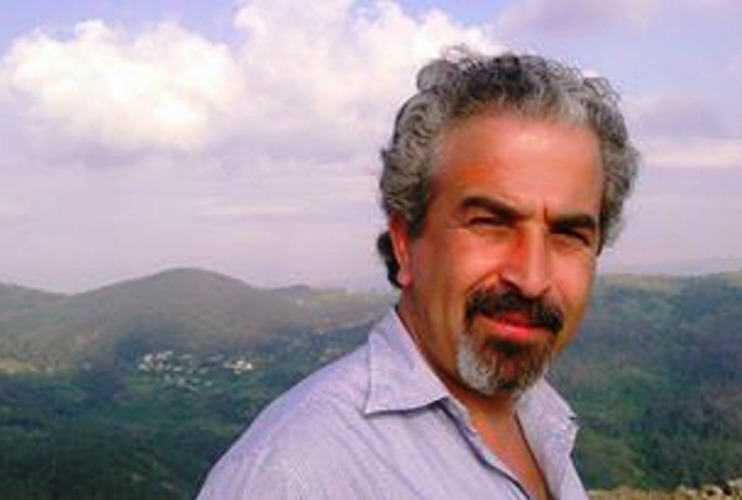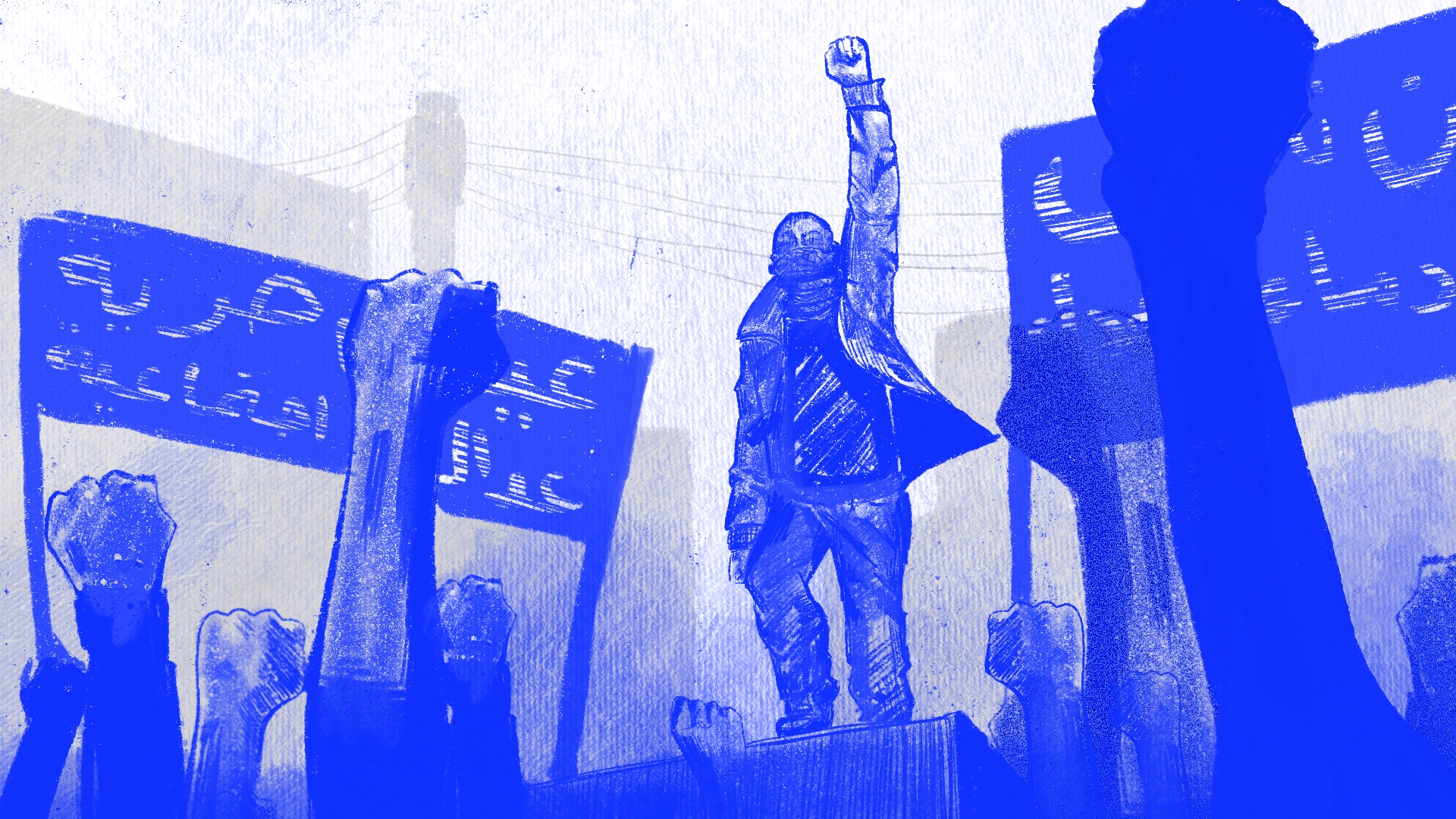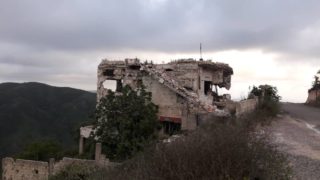Latakia - “The closer we got to the border, the louder our hearts screamed: Are we returning to face death once more, or should we stay in Lebanon and live under the constant fear of bombing and death?” In the end, life triumphed over fear: “Nothing will happen; God is protecting us.”
This is what Ahmad Ismail, a man fleeing/returning from the city of Tyre in southern Lebanon to Latakia in western Syria, says after the Israeli war on Lebanon. His epic journey lasted five days, during which he, along with his family—comprising six children, his sister, wife, father, and his 20-year-old brother—slept in public places and parking lots from Tyre to Beirut. Ahmad had initially fled from Syria to Lebanon in 2012 when battles engulfed his hometown in southern Idlib's countryside (Al-Janudiyah).
In the city of Latakia, after a journey that lasted one day and a night, Abu Yaqub (as he prefers to be called) was finally able to collapse onto a cotton mattress, sleeping for over ten uninterrupted hours, only disturbed by the faint noise of cars in the unfamiliar neighborhood. His children and their mother did the same. The family arrived at the Al-American neighborhood in Latakia late on the night of 10 October. Fortunately, both electricity and water were available. “This was a stroke of luck and blessing, as things aren't always this comfortable here,” says Abu Yaqub.
From Al-Qaniya to Beirut and a Reverse Journey to Latakia
Abu Yaqub, now in his fifties, hails from the Christian town of Al-Qaniya, near the Syrian city of Idlib. Both he and his wife hold degrees in French literature. He recounts, “When the battles reached Al-Qaniya during the Syrian war, I fled with my family (three sons, two of whom were in elementary school) to the city of Homs. We temporarily settled there with a friend's family for about a month. Later, we continued our journey to Lebanon through the official Al-Arida border crossing.” This happened in 2014, as Abu Yaqub recalls with a sense of bitterness: “In another country, ten years would have been enough to obtain citizenship. But this is impossible in Lebanon due to sectarian reasons that prevent increasing the number of certain communities by not granting Lebanese nationality. Moreover, I am Syrian, which makes it even more impossible. The only way would be through paying an enormous amount of dollars, which I simply do not have.”
Abu Yaqub settled as a tenant in the Mar Mikhael area of Beirut and began working in a role that suited his expertise: teaching French at a school affiliated with the Orthodox Church to which he and his family belong. His wife, Mirna, was also employed at the same school as an administrative staff member. They secured these jobs thanks to a recommendation from the village bishop, and the school helped enroll two of their three children (as it was an elementary school). Now, after ten years, their eldest son has reached the age of conscription, posing a new problem for the parents to solve.
“We were very fortunate compared to the hundreds of thousands of Syrians who arrived in Lebanon without hope or work,” says Mirna, who is in her early fifties, in an interview with Syria Untold she adds, “Our struggle with integrating into the local community was minimal, probably because we are Christians of the same denomination. Additionally, the area is a hub for young people, artists, writers, and is quite far from the tension that marked the lives of many Syrians and their integration into Lebanon.” Few people recognized them as Syrians except in rare cases that did not cause them any concern regarding work or social integration, even at the school. Being close to their children also facilitated the boys in forming friendships with Lebanese Christian classmates.
The closer we got to the border, the louder our hearts screamed: Are we returning to face death once more, or should we stay in Lebanon and live under the constant fear of bombing and death?” In the end, life triumphed over fear: “Nothing will happen; God is protecting us.
The Mar Mikhael area was spared from Israeli bombing unlike other parts of Beirut, such as Dahieh or Ghobeiry. However, the school where Abu Yaqub and his wife Mirna worked was transformed into a shelter for refugees from southern Lebanon, leading to the suspension of classes and their salaries. “We found ourselves caught between returning to Syria or attempting to leave Lebanon for Europe. Being Syrians, obtaining a visa was nearly impossible. It would take several months at the very least, involving embassy screenings, as any visa application from a Syrian was understood as an attempt to seek asylum in Europe,” explains Abu Yaqub. This uncertainty pushed them to return to a safer place where they had friends and remaining family members, choosing Latakia instead of their hometown. The family did not consider going back to Al-Qaniya because, as Abu Yaqub puts it, “My house there is currently occupied by families from the area, and I can't afford to evict them from the house and land. Some of them are armed. We've forgotten that we even have a house, land, and trees there; we haven't visited in ten years.” Abu Yaqub and his family re-entered Syria through the same Al-Arida crossing they had used to leave a decade ago. “The Syrian authorities at the border asked if we had relatives in Latakia—a question directed at both Syrians and Lebanese to determine if they should be directed to shelters or left to their own devices,” he explains.
He adds laughing, “Nothing has changed. The same system. Bribes can get you anything, even a tank if you want one.” Mirna, his wife, adds, “During the inspection, the main focus was on collecting bribes and scrutinizing young men with outstanding legal issues.” Their eldest son, who was of conscription age, presented a temporary deferment document from his draft office in Homs, which was valid for the remainder of the year. He would need to find another way to extend it or leave the country before the period expired. Despite this, they still had to pay a “welcome back tip” of 30,000 Syrian pounds (equivalent to about two dollars) to the officer who stamped their return passport. “Welcome back,” he said, handing back the passport with exaggerated politeness.
Abu Yaqub also did not have to exchange the mandatory 100 USD fee imposed on Syrians returning to the country, as this requirement has been temporarily suspended for two months.
Here and There... The Departed and Those Remaining
03 May 2024
Abu Yaqub rented a furnished apartment in the Al-American neighborhood for three million Syrian pounds (about 200 dollars) per month. He notes, “Luckily, we found a place. The rent in Beirut was double this amount. We haven't met the neighbors yet, but the area seems safe. The kids are still haunted by the bombing in Lebanon and have flashbacks to the shelling in Al-Qaniya, but we are trying to distract them with various activities. We haven't yet thought about (re-enrolling them in) school or finding work.”
Mirna describes her feelings about returning as mixed—partially happy yet incomplete, as she did not return to her hometown. She expresses relief for her family's safety, adding, “We are still alive amidst scenes of death and destruction. We escaped death, but in Lebanon, we lived trapped by our limited connection with the world, no matter how well things seemed. Every corner reminded us of the days of happiness we lost. We were like strangers in a land that wasn't ours, living in Lebanon with a constant sense of waiting, hoping to return to a homeland that no longer exists as it once did—prisoners to memories that have faded away.”
Syrians in Lebanon
Abu Yaqub's family remained in Beirut due to their work in education. In contrast, a large proportion of Syrian refugees in Lebanon—estimated at around 1.5 million according to the United Nations High Commissioner for Refugees (UNHCR)—moved to agricultural regions such as the Bekaa Valley and the South in search of work. This shift explains the deaths of nearly 200 Syrians from Israeli airstrikes targeting the Bekaa and southern regions. The largest toll was in the town of Younin in the Bekaa, where an Israeli raid at the end of September killed twenty Syrians, according to Lebanon's Ministry of Public Health Operations Center.
During his return journey from Beirut, Abu Yaqub met a former neighbor from Al-Janoudiyah, who had also returned to Latakia. Ahmad Ismail, aged 46, had fled to southern Lebanon in 2012 when the fighting reached his area in southern Idlib's countryside. He traveled with his family, which included six children, his sister, wife, father, and his 20-year-old brother.
Ahmad Ismail recounts his story: “We lived in the village of Batlouniyah (in the countryside of Tyre) for years, working in agriculture since I have no other trade. When the Israeli bombing intensified after 10 of September, a missile struck very close to the farm where I was employed. I had few options left, so we quickly packed our few belongings and headed to Tyre, and from there to Beirut. It took us five days to reach Beirut. We slept in parking lots, parks, and abandoned buildings.”
Ahmad continues, “We tried going to a shelter, once and then again. Whenever we saw a shelter, we would head there. But none of the centers would accept us. In the end, I realized I had to return to Syria because there was no other solution left for me. The roads were closed off to us.” He adds with a sense of despair, “The shelters for Lebanese refugees wouldn't take us, and those set up for Syrian refugees were overflowing beyond capacity. So, we decided to go back, come what may.”
With the increasing influx of displaced people, rental prices surged once again, rising by more than 100%. Ibrahim Al-Ahmad says, ‘I rented a furnished apartment on Jumhuriyyah Street for eight million Syrian pounds (about 550 dollars),” attributing this to 'greed.'
Ahmad recounts that he and his family took a bus to Tripoli after waiting for several hours at the overcrowded Tripoli bus station in Beirut. From there, they took a taxi to Wadi Khaled, where they could illegally cross into Syria. “We couldn't enter Syria through official channels because we had originally left the country via an unofficial route, and we don't have valid passports. Moreover, my younger brother is wanted for compulsory military service,” Ahmad explains.
The authorities in the areas under regime control, in theory, granted extensions for those who had failed to report to the military, extending up to almost a year. However, in practice, this may be subject to other non-legal considerations, such as the existence of criminal cases, at least according to statements made by these authorities.
Ahmad and his family's affiliation with Idlib—which is currently under opposition control—was enough to raise suspicions at the regime's security checkpoints, which are spread across the Syrian-Lebanese border, preventing them from heading to areas controlled by Damascus. Ahmad shares in his conversation with Syria Untold: “The roads were closed to us, and we were not accepted at Lebanese refugee centers. As for the Syrian refugee centers, all of them were full and overcrowded. Therefore, we decided to return, come what may... Nothing bad will happen to us, God will protect us.”
Ahmad continues: “There are around twenty unofficial crossings between Syria and Lebanon, with five or six in the Wadi Khaled area. Anyone crossing pays between thirty and fifty dollars. I paid 200 dollars for the entire family, and the smugglers kindly took us to an area near the international highway between Homs and Tartous. From there, we managed on our own and headed to Latakia.”
A few days after his arrival, Ahmad visited the nearby school complex (east of Quneins) and inquired about enrolling his younger children. He explains, “Before we left Lebanon, the children studied the curriculum provided by UNICEF. We couldn't enroll them in the official Lebanese schools because we didn’t have official residency there. In Syria, there is a special curriculum for children who have been out of the official education system, called the 'Curriculum B'. The children will join this program.”
Back in Syria
Ahmad recounts, “I couldn't afford the enormous costs of continuing my journey to Idlib. The cost of transporting my family, which consists of five adults and six children, to Idlib is at least 3,000 U.S. dollars—an amount I don’t even have a quarter of.” Therefore, he preferred to stay in areas under the regime's control, especially since there were no security issues for him or his family, except for his younger brother, who is wanted for compulsory military service. “He won't stay here; he will try to reach a relative in Denmark, who has offered to cover the expenses to get him there and take care of his situation.”
From Damascus to Palmyra: Post-Bellum Syria as Seen by an Italian
15 April 2024
The idea of migration to Europe crosses the minds of some returnees due to the dire conditions in Syria and the lack of suitable job opportunities. There seems to be no light at the end of the tunnel, as Ahmad speculates. He mentions that the reason for his return to regime-controlled areas is the need for official documents, particularly a passport, in case his brother decides to leave permanently. European countries and Turkey do not accept passports that are not stamped by the authorities in Damascus.
Since the start of the Israeli attack on Lebanon, the number of Syrians returning to the country has reached approximately 311,000, according to Lebanese Interior Minister Bassam Mawlawi, along with 145,000 Lebanese citizens, as reported by the Syrian Ministry of Health. These numbers closely align with those from Lebanon's official Disaster Risk Management Unit. The Syrian regime suspended the requirement for Syrians to exchange 100 dollars at the official exchange rate for entry into the country through border crossings with Lebanon.
As of 20 October 2024, the regime has opened 20 shelters across Rural Damascus, Homs, and Tartous provinces. Tartous received 22,000 Syrians and 10,000 Lebanese, with an unknown number heading to Latakia. Around 14,000 people arrived in Aleppo, and 4,000 people reached northwestern Syria, according to the United Nations. In the Autonomous Administration areas, about 20,000 people arrived, including roughly 100 Lebanese. More Syrians are expected to continue arriving in the coming period, making up 70% of the displaced, according to the United Nations. Generally, the majority of returning Syrians have remained in regime-controlled areas.
Dr. Mohammad Al-Ibrahim, a lecturer at Tishreen University, points out that Damascus “has frozen the previous conditions it set for the return of Syrian refugees from Lebanon, which included the reconstruction of infrastructure and rehabilitation before accepting the returnees. Instead, it has shifted to offering facilities for the return of hundreds of thousands of Syrians, while halting security prosecutions, according to official media. This is an attempt to economically capitalize on the refugee issue by requesting UN assistance, while waiting for regional arrangements in which Damascus will have a stake after the war.”
On 8 October 2024, the UN High Commissioner for Refugees, Filippo Grandi, called for a fundraising appeal to secure $324 million to assist all those fleeing from Lebanon to Syria. Meanwhile, the European Union immediately contributed 500,000 euros to the UN Refugee Agency to support its response operations for those fleeing Lebanon into Syria.
While Syrian Foreign Minister Faisal Muqdad denied the arrest of any returning Syrians, asserting that “all political and security sentences against Syrians have been lifted, except for personal rights,” local sources and the Syrian Network for Human Rights reported the arrest of nine individuals from Rural Damascus and four from Sweida. However, no local sources have reported arrests in the coastal regions of Syria following the arrival of the displaced. It is likely that those entering through official border crossings are individuals not wanted by security agencies.
Syrians with Less Luck in Finding Homes and Jobs
The financial situation of the Muqdad family, who returned from southern Lebanon and originally came from Rural Aleppo, did not allow them to rent a house in the city of Latakia or its suburbs. Therefore, they headed to the village of Umm al-Tuyur (25 km from Latakia), where they were able to rent a reasonably priced house for “half a million Syrian Pounds, furnished with acceptable furniture” (equivalent to 35 dollars). Muqdad says, “The neighbors in Umm al-Tuyur welcomed us and helped us secure essential items like clothes and food. Then, the Red Crescent arrived and provided blankets, food, canned goods, and children’s necessities.” Today, about 50 Syrian families live in this coastal village. Next to the Muqdad family, several other families either sought refuge with relatives or rented in areas further from the city, such as Al-Basit (90 km from Latakia), primarily due to economic reasons.
The Mazut Seller
25 April 2024
Before the recent displacement from Lebanon, the Syrian regions, including Latakia, were already witnessing escalating service, economic, and humanitarian crises. These issues included difficulties securing housing, drinking water, and electricity, as well as weak communications and limited job opportunities. In addition, even subsidized fuel became scarce.
As the demand for rentals increased, housing rents in Latakia rose by between 25% and 80% depending on the residential area. Hassan, a real estate office owner in the 7th Project area, says, “In areas like Zira'a, the 10th Project, and Al-American (considered wealthy, modern construction areas), rent for apartments can reach up to 200 USD, while in suburban areas like Saqoubin, Sanjwan, and Bassnada, rent for furnished houses ranges between 80 and 100 USD, with lower prices for unfurnished homes. These rates are close to pre-crisis rental prices, as the rental market has been priced in dollars for years.”
However, with the increasing flow of displaced people, rents have risen again by over 100%. Ibrahim Ahmad says, “I rented a furnished apartment on Jumhuriyyah Street for eight millions Syrian pounds (about 550 dollars),” attributing this to 'greed.'” he explains. According to Hassan, “Real estate office owners are monopolizing the market and prefer tenants who pay upfront for future months, rather than those who do not. Many of the displaced have arrived here without furniture or bedding, which has increased demand for furnished apartments.”
To the Mountain Waiting for the Battles to Calm
Late on the night of 20 October 2024, Ramia arrived in her village in Bayt Yashut (rural Jableh) from Baalbek, accompanied by two other people from the village. Ramia recounts that she had stayed in Beirut for a while, working in a café to save money for her trip to Germany. “I worked for five years in a café on Hamra Street” she says. “My goal was to reach Germany after graduating from university, from the Faculty of Civil Engineering, with high marks. I rejected a government job, and my family didn’t oppose my traveling because most people were aware of the dire situation in Syria. The war shattered that goal because there is no longer work. I am currently waiting for the battles to calm down, hoping I might find a new job, this time related to civil engineering, instead of working in cafés, and continue my attempt to travel.”
While chatting with her companions, she feels a strong desire to regain her life, despite all the difficulties.
The exact number of those returning from Lebanon to the Syrian coastal mountains is not known, and while Lebanon has been a transit point for many of these Syrians, especially students or university graduates, the few farmers among them mostly headed to southern Lebanon, preferring to stay in the Bekaa Valley, Tripoli, or Beirut.
Civil Society Supports the Returnees
A number of individual and collective initiatives have been launched by Syrians through social media to secure housing, food, medicine, and other essential needs for all those arriving. Local organizations and communities are contributing to meeting the needs of these people within their limited capacities. “We received a quantity of materials through the Ministry of Social Affairs and Labor, and we distributed them to the returning Syrians primarily,” Rawan from the “Al-Ma7abba Makers” association says. “These individuals are spread across several areas of the city, and no specific shelters have been opened for Syrians because the majority have housing or relatives. Moreover, the Syrian government authorities are keen on avoiding a repeat of refugee camp situations, especially with the large number of Lebanese displaced people.” Rawan continues, stating that some civil centers provide psychological and medical services to the displaced, particularly women, including pregnant women and children.
The Options of Returning Syrians Today and Tomorrow
The number of Syrians registered with the United Nations High Commissioner for Refugees (UNHCR) reached about 785,000 refugees in 2023, while the number of non-residents is estimated to be similar. The official number of returnees so far is 311,000.
It is expected that those who have residency in Lebanon will return once the situation there improves. However, until the situation improves, their options remain very limited. Abu Yaaqoub, for example, is still relying on his savings, which are gradually depleting. However, he benefits from the exchange rate difference between the dollar and the Syrian pound (1 USD is about 15,000 SYP). “Food prices are high, but they are still lower than in Lebanon. But that doesn't mean there isn't inflation and a big price difference compared to 2014. To be honest, we weren't enthusiastic about returning, especially with Syria's bad conditions, such as the lack of electricity, water, and limited job opportunities, but we have no choice.” Meanwhile, Ahmad and his family live in the area of Quneins, which houses a number of residents from Idlib who have been displaced here for decades. Since “a borrowed coat doesn't warm you,” as the saying goes, Ahmad began his search for work: “I want to find a job here in agriculture or rent land and farm it. This is the only profession I know. My family and I will stay here for a long time since returning to Idlib is not possible right now.” As for Ramia, she says firmly: “I cannot give up... I will continue pursuing my dream (to reach Germany), even if the road is difficult.”











